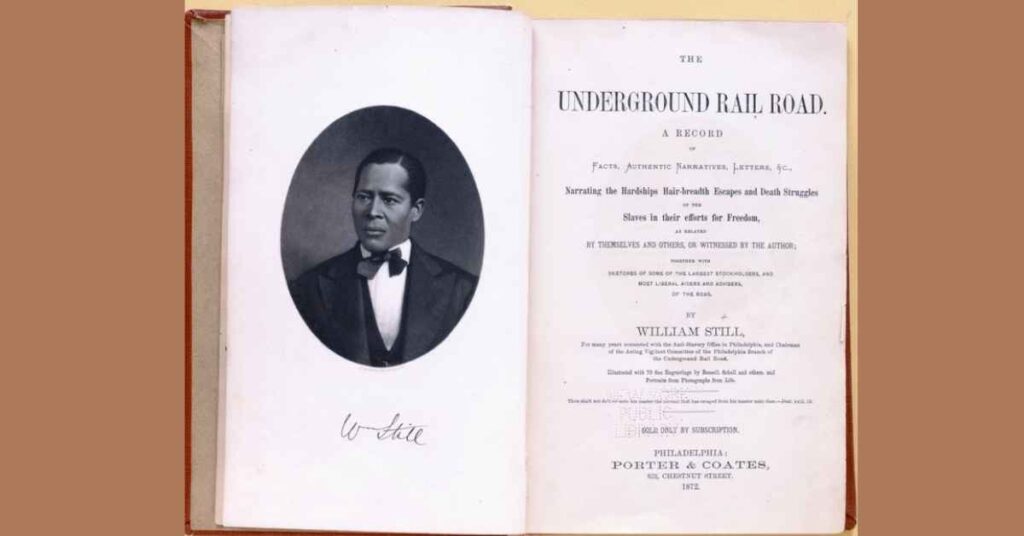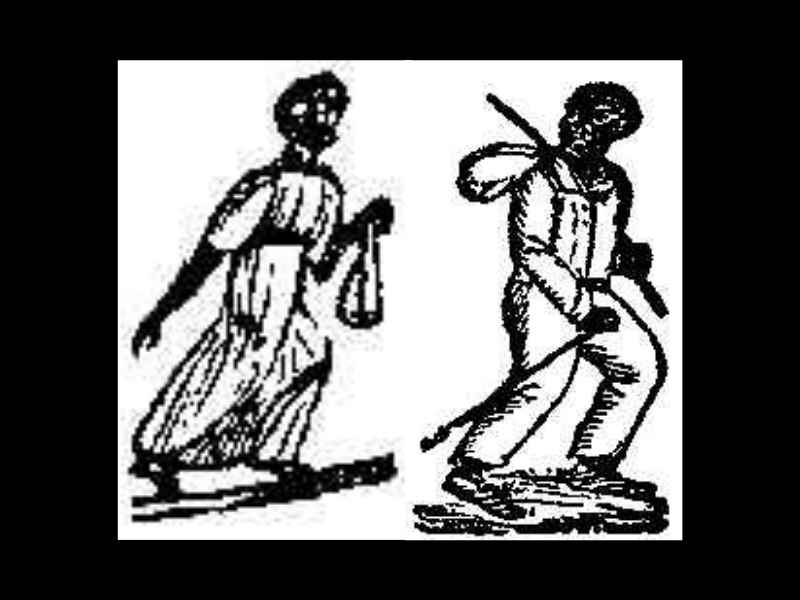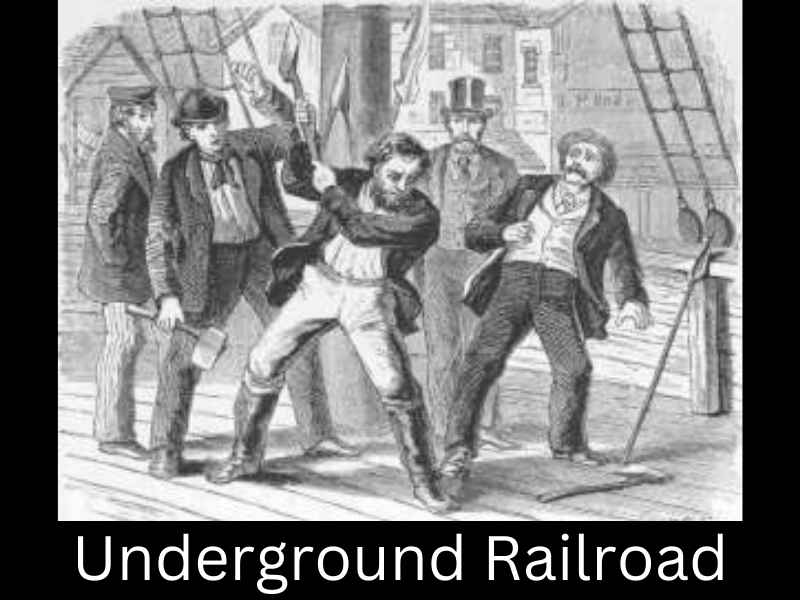This is an excerpt from William Still’s book, The Underground Railroad. Most of our excepts focus on the stories of black fugitives making their escape from the South to freedom.
The account here concerns a white conductor on the route. Captain Fountain used his ship to smuggle large numbers of fugitives from the South to Philadelphia.
William Still refers to him as “one of the most daring and heroic Captains ever connected with the Underground Rail Road cause.” This excerpt documents how he concealed twenty-eight passengers by outwitting a search by the Mayor and police force of Norfolk.
The narrative refers to “Captain F” to hide his name at the time of writing. But one of the illustrations in the published book names him as Captain Fountain.
Excerpt – Some Background About Captain Fountain

CAPTAIN F. was certainly no ordinary man.
Although he had been living a sea-faring life for many years, and the marks of this calling were plainly enough visible in his manners and speech, he was, nevertheless, unlike the great mass of this class of men, not addicted to intemperance and profanity.
On the contrary, he was a man of thought, and possessed, in a large measure, those humane traits of character which lead men to sympathize with suffering humanity wherever met with.
It must be admitted, however, that the first impressions gathered from a hasty survey of his rough and rugged appearance, his large head, large mouth, large eyes, and heavy eye-brows, with a natural gift at keeping concealed the inner-workings of his mind and feelings, were not calculated to inspire the belief,
…that he was fitted to be entrusted with the lives of unprotected females, and helpless children;
…that he could take pleasure in risking his own life to rescue them from the hell of Slavery;
…that he could deliberately enter the enemy’s domain, and with the faith of a martyr, face the dread slave-holder, with his Bowie-knives and revolvers—Slave-hunters, and blood-hounds, lynchings, and penitentiaries, for humanity’s sake.
But his deeds proved him to be a true friend of the Slave; whilst his skill, bravery, and success stamped him as one of the most daring and heroic Captains ever connected with the Underground Rail Road cause.
At the time he was doing most for humanity in rescuing bondsmen from Slavery, Slave-laws were actually being the most rigidly executed.
To show mercy, in any sense, to man or woman, who might be caught assisting a poor Slave to flee from the prison-house, was a matter not to be thought of in Virginia.
This was perfectly well understood by Captain F.; indeed he did not hesitate to say, that his hazardous operations might any day result in the “sacrifice” of his life.
But on this point he seemed to give himself no more concern than he would have done to know which way the wind would blow the next day. He had his own convictions about dying and the future, and he declared, that he had “no fear of death,” however it might come.
Still, he was not disposed to be reckless or needlessly to imperil his life, or the lives of those he undertook to aid. Nor was he averse to receiving compensation for his services.
How People Found The Captain’s Services

In Richmond, Norfolk, Petersburg, and other places where he traded, many slaves were fully awake to their condition. The great slave sales were the agencies that served to awaken a large number.
Then the various mechanical trades were necessarily given to the Slaves, for the master had no taste for “greasy, northern mechanics.” Then, again, the stores had to be supplied with porters, draymen, etc., from the slave population.
In the hearts of many of the more intelligent amongst the slaves, the men, as mechanics, etc., the women, as dress-makers, chamber-maids, etc., notwithstanding all the opposition and hard laws, the spirit of Freedom was steadily burning.
Many of the slaves were half brothers, and sisters, cousins, nephews, and nieces to their owners, and of course “blood would tell.”
It was only necessary for the fact to be made known to a single reliable and intelligent slave, that a man with a boat running North had the love of Freedom for all mankind in his bosom to make that man an object of the greatest interest.
If an angel had appeared amongst them doubtless his presence would not have inspired greater anxiety and hope than did the presence of Captain F.
The class most anxious to obtain freedom could generally manage to acquire some means which they would willingly offer to captains or conductors in the South for such assistance as was indispensable to their escape.
Many of the slaves learned if they could manage to cross Mason and Dixon’s line, even though they might be utterly destitute and penniless, that they would then receive aid and protection from the Vigilance Committee.
Here it may be well to state that, whilst the Committee gladly received and aided all who might come or be brought to them, they never employed agents or captains to go into the South with a view of enticing or running off slaves.
So when captains operated, they did so with the full understanding that they alone were responsible for any failures attending their movements.
Twenty-One Fugitives On Board
The way is now clear to present Captain F. with his schooner lying at the wharf in Norfolk, loading with wheat, and at the same time with twenty-one fugitives secreted therein.
While the boat was thus lying at her mooring, the rumor was flying all over town that a number of slaves had escaped, which created a general excitement a degree less, perhaps, than if the citizens had been visited by an earthquake.
The mayor of the city with a posse of officers with axes and long spears repaired to Captain F.’s boat. The fearless commander received his Honor very coolly, and as gracefully as the circumstances would admit.
The mayor gave him to understand who he was, and by what authority he appeared on the boat, and what he meant to do.
“Very well,” replied Captain F., “here I am and this is my boat, go ahead and search.”
His Honor with his deputies looked quickly around, and then an order went forth from the mayor to “spear the wheat thoroughly.” The deputies obeyed the command with alacrity.
But the spears brought neither blood nor groans, and the sagacious mayor obviously concluded that he was “barking up the wrong tree.”
But the mayor was not there for nothing. “Take the axes and go to work,” was the next order; and the axe was used with terrible effect by one of the deputies.
The deck and other parts of the boat were chopped and split; no greater judgment being exercised when using the axe than when spearing the wheat; Captain F. all the while wearing an air of utter indifference or rather of entire composure.
Indeed every step they took proved conclusively that they were wholly ignorant with regard to boat searching.
A Bold Strategic Move
At this point, with remarkable shrewdness, Captain F. saw wherein he could still further confuse them by a bold strategical move.
As though about out of patience with the mayor’s blunders, the captain instantly reminded his Honor that he had “stood still long enough” while his boat was being “damaged, chopped up,” &c.
“Now if you want to search,” continued he, “give me the axe, and then point out the spot you want opened and I will open it for you very quick.”
While uttering these words he presented, as he was capable of doing, an indignant and defiant countenance, and intimated that it mattered not where or when a man died provided he was in the right, and as though he wished to give particularly strong emphasis to what he was saying, he raised the axe, and brought it down edge foremost on the deck with startling effect, at the same time causing the splinters to fly from the boards.

The mayor and his posse seemed, if not dreadfully frightened, completely confounded, and by the time Captain F. had again brought down his axe with increased power, demanding where they would have him open, they looked as though it was time for them to retire, and in a few minutes after they actually gave up the search and left the boat without finding a soul.
Daniel in the lions’ den was not safer than were the twenty-one passengers secreted on Captain F.’s boat. The law had been carried out with a vengeance, but did not avail with this skilled captain.
The “five dollars” were paid for being searched, the amount which was lawfully required of every captain sailing from Virginia.
And the captain steered direct for the City of Brotherly Love. The wind of heaven favoring the good cause, he arrived safely in due time, and delivered his precious freight in the vicinity of Philadelphia within the reach of the Vigilance Committee.
Who Were The Fugitives?
The names of the passengers were as follows:
ALAN TATUM, DANIEL CARR, MICHAEL VAUGHN, THOMAS NIXON, FREDERICK NIXON, PETER PETTY, NATHANIEL GARDENER, JOHN BROWN, THOMAS FREEMAN, JAMES FOSTER, GODFREY SCOTT, WILLIS WILSON, NANCY LITTLE, JOHN SMITH, FRANCIS HAINES, DAVID JOHNSON, PHILLIS GAULT, ALICE JONES, NED WILSON, and SARAH C. WILSON, and one other, who subsequently passed on, having been detained on account of sickness.
[We have an excerpt of the testimonies of five of these passengers here.]
These passengers were most “likely-looking articles;” a number of them, doubtless, would have commanded the very highest prices in the Richmond market.
Among them were some good mechanics, one excellent dress-maker, some “prime” waiters and chambermaids; men and women with brains, some of them evincing remarkable intelligence and decided bravery, just the kind of passengers that gave the greatest satisfaction to the Vigilance Committee.
Source
The Underground Railroad by William Still was published in 1872.
The book is in the public domain. It can be found in the Library of Congress.